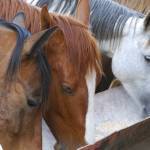Potential Cause of Bowel Disease in Horses Found

Horses with inflammatory bowel disease (IBD) serve as a source of frustration for owners and veterinarians. Despite being a well-recognized disease, IBD continues to pose diagnostic and treatment dilemmas. Without a more complete understanding of why inflammatory cells flock to the intestinal walls, treatment will continue to be evasive.
Recently, veterinary researchers looked at a population of nerve cells in the walls of the small intestine called interstitial cells of Cajal (ICC)*. They proposed that these cells, which play an integral role in coordinating the muscular contractions of the intestine, could be involved in IBD.
“ICCs, also known as pacemaker cells, are found in the walls of the intestine. Only if present in normal numbers and if functioning properly can they support normal, rhythmic contractions of the small intestine that help propel digesta in the proper direction,” explained Catherine Whitehouse, M.S., a nutritionist at Kentucky Equine Research.
In other words, improper gut motility due to the presence of various inflammatory cells in patients with IBD could explain why affected horses colic so frequently. To determine if this hypothesis had validity, researchers collected tissue samples from the small intestine (ileum) of horses with IBD and without. These ileal samples were stained and the number of ICCs counted.
“The researchers found fewer ICC networks in IBD horses compared with the controls, but other cells that innervate the intestinal tract were normal,” shared Whitehouse. The researchers therefore concluded that “disruption to ICC networks may contribute to the clinical signs of colic in some horses with IBD.” Further research is therefore indicated.
In the meantime, omega-3 fatty acids possess natural anti-inflammatory properties and reportedly benefit human patients suffering various forms of IBD. Kentucky Equine Research offers EO-3, a potent marine-derived oil that is rich in both EPA and DHA. This product is top-dressed onto feed and supplies almost 10,000 mg of omega-3 fatty acids per 30 mL serving.
*Fintl, C., R. Lindberg, and C. McL Press. 2020. Myenteric networks of interstitial cells of Cajal are reduced in horses with inflammatory bowel disease. Equine Veterinary Journal 52(2):298-304.








